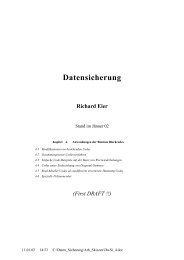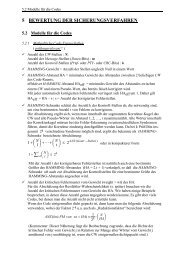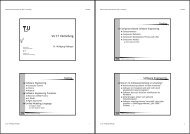Wave Propagation in Linear Media | re-examined
Wave Propagation in Linear Media | re-examined
Wave Propagation in Linear Media | re-examined
You also want an ePaper? Increase the reach of your titles
YUMPU automatically turns print PDFs into web optimized ePapers that Google loves.
4.6 Examples of tunnell<strong>in</strong>g events<br />
The two graphs also <strong>re</strong>veal that the deviation between the two curves deteriorates as the<br />
barrier thickness is <strong>in</strong>c<strong>re</strong>ased.<br />
The conclusions to be drawn from the above a<strong>re</strong>:<br />
The barrier acts like a high-pass lter favour<strong>in</strong>g the high-energy components of the<br />
<strong>in</strong>cident wave packet. Thus the transmitted portion of the wave experiences a f<strong>re</strong>quency<br />
skew<strong>in</strong>g and a shift of its e ective cent<strong>re</strong> f<strong>re</strong>quency to higher values. This pulse <strong>re</strong>shap<strong>in</strong>g<br />
e ect occurs always, no matter how narrow-band the wave packet orig<strong>in</strong>ally was, and<br />
it is mo<strong>re</strong> marked for low-energy waves.<br />
The phase time theory is <strong>in</strong> good ag<strong>re</strong>ement with numerically found tunnell<strong>in</strong>g times,<br />
provided that the wave packet exhibits a dom<strong>in</strong>at<strong>in</strong>g peak that can be traced and<br />
taken as a measu<strong>re</strong> for the propagation. Furthermo<strong>re</strong>, the wave packet must also be<br />
very narrow-band so that the group velocity approximation for the propagation velocity<br />
holds. The spectrum need not be con ned to the evanescent <strong>re</strong>gion, and it may also<br />
extend <strong>in</strong>to the pass band.<br />
The phase time approximation becomes worse for very low energies of the <strong>in</strong>cident<br />
electron due to the <strong>re</strong>latively seve<strong>re</strong>r e ect of pulse <strong>re</strong>shap<strong>in</strong>g <strong>in</strong> this <strong>re</strong>gion.<br />
If the <strong>in</strong>itial wave packet is not small-band, the phase time gives no appropriate description<br />
of the tunnell<strong>in</strong>g time except for very large energies <strong>in</strong> the pass band. If the<br />
tunnell<strong>in</strong>g time is still based on the evolution of the peak of the wave packet, even<br />
negative delay times may be obta<strong>in</strong>ed. It is questionable whether the de nition of the<br />
tunnell<strong>in</strong>g time is still sensible then.<br />
As for the faster-than-light debate, we st<strong>re</strong>ss that the fo<strong>re</strong>go<strong>in</strong>g exam<strong>in</strong>ation was based<br />
on the non-<strong>re</strong>lativistic Schrod<strong>in</strong>ger equation. In the enti<strong>re</strong> chapter, the velocity of light<br />
appea<strong>re</strong>d not a s<strong>in</strong>gle time. So <strong>in</strong> order to judge how fast the particles or waves actually<br />
travel, we would need to take the theory of <strong>re</strong>lativity <strong>in</strong>to account. Note also that <strong>in</strong><br />
contrast to the electromagnetic case, the quantum mechanical wave function has no nite<br />
wave front velocity. The <strong>re</strong>ason for this di e<strong>re</strong>nce is the quadratic dispersion <strong>re</strong>lation<br />
of quantum waves, whe<strong>re</strong>as those of wave guides and lossless plasmas a<strong>re</strong> hyperbolic.<br />
This exposes the limitation of the analogy between undersized wave guides and squa<strong>re</strong><br />
barriers: it is valid as long as the <strong>re</strong>spective di e<strong>re</strong>ntial equations a<strong>re</strong> <strong>re</strong>garded. As one<br />
looks <strong>in</strong>to their solutions, however, it b<strong>re</strong>aks down.<br />
117












